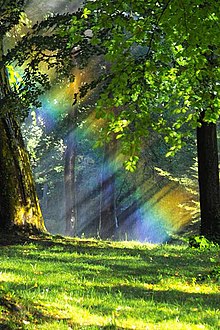Ode: Intimations of Immortality
Appearance

The earth, and every common sight,
To me did seem
Apparelled in celestial light,
The glory and the freshness of a dream.
Ode: Intimations of Immortality from Recollections of Early Childhood was a poem by William Wordsworth, begun on March 27, 1802 and finished by 1806, possibly in early 1804. Wordsworth declared: "Two years at least passed between the writing of the four first stanzas and the remaining part".
Quotes
[edit]
And lovely is the Rose…

But yet I know, where'er I go,
That there hath past away a glory from the earth.

Where is it now, the glory and the dream?

Of the eternal Silence: truths that wake,
To perish never;
Which neither listlessness, nor mad endeavor,
Nor Man nor Boy,
Nor all that is at enmity with joy,
Can utterly abolish or destroy!

Thanks to its tenderness, its joys, and fears,
To me the meanest flower that blows can give
Thoughts that do often lie too deep for tears.
- There was a time when meadow, grove, and stream,
The Earth, and every common sight,
To me did seem
Apparelled in celestial light,
The glory and the freshness of a dream.
It is not now as it hath been of yore—
Turn wheresoe'er I may,
By night or day,
The things which I have seen I now can see no more.- Stanza 1
- The Rainbow comes and goes,
And lovely is the Rose,
The Moon doth with delight
Look round her when the heavens are bare;
Waters on a starry night
Are beautiful and fair;
The sunshine is a glorious birth;
But yet I know, where'er I go,
That there hath past away a glory from the earth.- Stanza 2
- Ye blessed Creatures, I have heard the call
Ye to each other make; I see
The heavens laugh with you in your jubilee;
My heart is at your festival,
My head hath its coronal,
The fulness of your bliss, I feel— I feel it all.
Oh evil day! if I were sullen
While the Earth herself is adorning,
This sweet May-morning.- Stanza 4
- Whither is fled the visionary gleam?
Where is it now, the glory and the dream?- Stanza 4
- Our birth is but a sleep and a forgetting:
The Soul that rises with us, our life's Star,
Hath had elsewhere its setting,
And cometh from afar:
Not in entire forgetfulness,
And not in utter nakedness,
But trailing clouds of glory do we come
From God, who is our home:
Heaven lies about us in our infancy!
Shades of the prison-house begin to close
Upon the growing boy.- Stanza 5
- The youth, who daily farther from the east
Must travel, still is Nature's priest,
And by the vision splendid
Is on his way attended;
At length the man perceives it die away,
And fade into the light of common day.- Stanza 5
- As if his whole vocation
Were endless imitation.- Stanza 7
- Thou, whose exterior semblance doth belie
Thy Soul's immensity;
Thou best Philosopher, who yet dost keep
Thy heritage, thou Eye among the blind,
That, deaf and silent, read'st the eternal deep,
Haunted for ever by the eternal mind,—
Mighty Prophet! Seer blest!
On whom those truths do rest,
Which we are toiling all our lives to find,
In darkness lost, the darkness of the grave.- Stanza 8
- O joy! that in our embers
Is something that doth live,
That nature yet remembers
What was so fugitive!
The thought of our past years in me doth breed
Perpetual benediction: not indeed
For that which is most worthy to be blest;
Delight and liberty, the simple creed
Of Childhood, whether busy or at rest,
With new-fledged hope still fluttering in his breast:—
Not for these I raise
The song of thanks and praise;
But for those obstinate questionings
Of sense and outward things,
Fallings from us, vanishings;
Blank misgivings of a Creature
Moving about in worlds not realised,
High instincts before which our mortal Nature
Did tremble like a guilty Thing surprised:
But for those first affections,
Those shadowy recollections,
Which, be they what they may,
Are yet the fountain-light of all our day,
Are yet a master-light of all our seeing;
Uphold us, cherish, and have power to make
Our noisy years seem moments in the being
Of the eternal Silence: truths that wake,
To perish never;
Which neither listlessness, nor mad endeavor,
Nor Man nor Boy,
Nor all that is at enmity with joy,
Can utterly abolish or destroy!- Stanza 9
- Though inland far we be,
Our souls have sight of that immortal sea
Which brought us hither.- Stanza 9
- Then sing, ye Birds, sing, sing a joyous song!
And let the young Lambs bound
As to the tabor's sound!
We in thought will join your throng,
Ye that pipe and ye that play,
Ye that through your hearts today
Feel the gladness of the May!
What though the radiance which was once so bright
Be now forever taken from my sight,
Though nothing can bring back the hour
Of splendour in the grass, of glory in the flower;
We will grieve not, rather find
Strength in what remains behind;
In the primal sympathy
Which having been must ever be;
In the soothing thoughts that spring
Out of human suffering;
In the faith that looks through death,
In years that bring the philosophic mind.- Stanza 10
- And O, ye Fountains, Meadows, Hills, and Groves,
Forebode not any severing of our loves!
Yet in my heart of hearts I feel your might;
I only have relinquished one delight
To live beneath your more habitual sway.
I love the Brooks which down their channels fret,
Even more than when I tripped lightly as they;
The innocent brightness of a new-born Day
Is lovely yet;
The Clouds that gather round the setting sun
Do take a sober colouring from an eye
That hath kept watch o'er man's mortality;
Another race hath been, and other palms are won.
Thanks to the human heart by which we live,
Thanks to its tenderness, its joys, and fears,
To me the meanest flower that blows can give
Thoughts that do often lie too deep for tears.- Stanza 11


